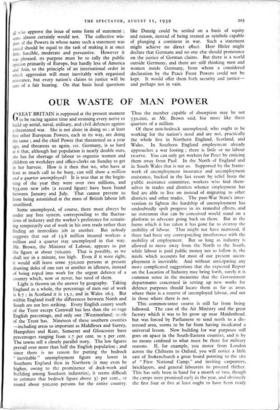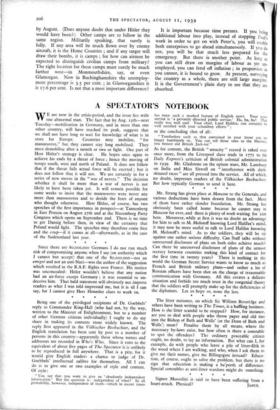OUR WASTE OF MAN POWER G REAT BRITAIN is supposed at
the present moment to be racing against time and straining every nerve to build up aerial, naval, military, and civil defences against a threatened war. She is not alone in doing so ; at least rive other European Powers, each in its way, are doing the same ; and the chief Power that threatened us a year ago, and threatens us again, viz. Germany, is so hard at it that, although her population is nearly double ours, she has for shortage of labour to organise women and children on weekdays and office-clerks on Sunday to get in her harvest. How is it then that we, who have at least as much call to be busy, can still show a million and a quarter unemployed? It is true that at the begin- ning of the year they were over two millions, and 833,000 new jobs (a record figure) have been found between January and July. That cannot prevent us from being astonished at the mass of British labour left unutilised.
Some unemployed, of course, there must always be under any free system, corresponding to the fluctua- tions of industry and the worker's preference for remain- ing temporarily out of work in his own trade rather than finding an immediate job in another. But nobody suggests that out of 13.8 million insured workers a million and a quarter stay unemployed in that way. Mr. Brown, the Minister of Labour, appears to put the figure at about 700,000. That is possibly, as we shall see in a minute, too high. Even if it were right, it would still leave some 550,000 persons at present drawing doles of one sort or another in idleness, instead of being roped into work for the urgent defence of a country which, now or never, has need of them.
Light is thrown on the answer by geography. Taking England as a whole, the percentage of men out of work IS 8.7; in Scotland it is 13.i, and in Wales 16.5. But within England itself the differences between North and South are not less striking. Every English county south of the Trent except Cornwall has less than the average English percentage, and only one (Westmorland) ncrth of the Trent has. Nineteen of these southern counties —including areas so important as Middlesex and Surrey, Hampshire and Kent, Somerset and Gloucester have percentages ranging from 1.7 per cent. to 5 per cent. The towns tell a closely parallel story. The low figures prevail over more than half the English population ; and since there is no reason for putting the bedrock " inevitable " unemployment figure any lower in Southern England than in Northern (it may even be higher, owing to the prominence of dock-work and building among Southern industries), it seems difficult to estimate that bedrock figure above 3+ per cent., or round about 5oo,000 persons for the entire country. Thus the number capable of absorption may be not 550,000, as Mr. Brown said, but more like three quarters of a million.
Of these non-bedrock unemployed, who ought to be working for the nation's need and are not, practically the whole live in Northern England, Scotland, and Wales. In Southern England employment already approaches a war footing ; there is little or no labour reserve. You can only get workers for Peter by enticing them away from Paul. In the North of England and in South Wales that is not so. Supported by the frame- work of unemployment insurance and unemployment assistance, backed in the last resort by relief from the public assistance committee, workers who find them- selves in trades and districts whence employment has fled are able to live on instead of migrating to other districts and other trades. The post-War State's inter- vention to lighten the hardship of unemployment has undoubtedly spelt progress in its remedial effects, and no statesman that can be conceived would stand on a platform to advocate going back on them. But in the forms which it has taken it has gone far to destroy the mobility of labour. That might not have mattered, if there had been any corresponding interference with the mobility of employment. But so long as industry is allowed to move away from the North to the South, while labour is paid public money not to follow it, the misfit which accounts for most of our present unem- ployment is inevitable. And without anticipating any more complicated suggestions that the expected Report on the Location of Industry may bring forth, surely it is common sense in the meantime that the Government departments concerned in setting up new works for defence purposes should locate them as far as areas where there is a reserve of unemployed labour, and not in those where there is not.
This common-sense course is still far from being followed. The case of the Air Ministry and the great factory which it was to let grow up near Maidenhead, but was forced by Parliament to send north to a dis- tressed area, seems to be far from having inculcated a universal lesson. New building for war purposes still goes on apace in the South-Eastern counties, and is by no means confined to what must be there for military reasons. If, for example, you motor from London across the Chilterns to Oxford, you will notice a little east of Stokenchurch a great board pointing to the site of. "First National Camp," and inviting carpenters, bricklayers, and general labourers to proceed thither. This has only been in hand for a month or two, though the camps were promised early in the year, and obviously the first four or five at least ought to have been ready by August. (Does anyone doubt that under Hitler they would have been?) Other camps are to follow in the same region. Militarily speaking, that surely is folly. If any area will be much flown over by enemy aircraft, it is the Home Counties ; and if any target will draw their bombs, it is camps ; for how can airmen be expected to distinguish civilian camps from military? The right location for these camps must surely be much farther west—in Monmouthshire, say, or even Glamorgan. Now in Buckinghamshire the unemploy- ment percentage is 3.5 per cent. ; in Glamorganshire it is 17.6 per cent. Is not that a most important difference? It is important because time presses. If you bring additional labour into play, instead of stopping Paul's work in order to get on with Peter's, you will enable both enterprises to go ahead simultaneously. If you do not, you will be that much less prepared for the emergency. But there is another point. As long as you can still draw on margins of labour as yet un- employed, you can fend off inflation ; in proportion as you cannot, it is bound to grow. At present, surveying the country as a whole, there are still large margins. It is the Government's plain duty to see that they are absorbed.









































 Previous page
Previous page